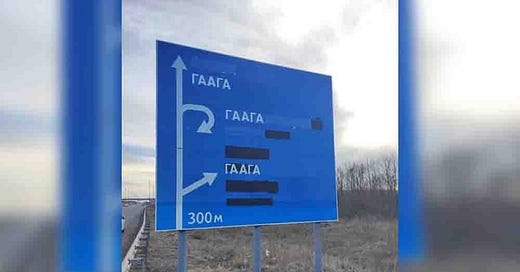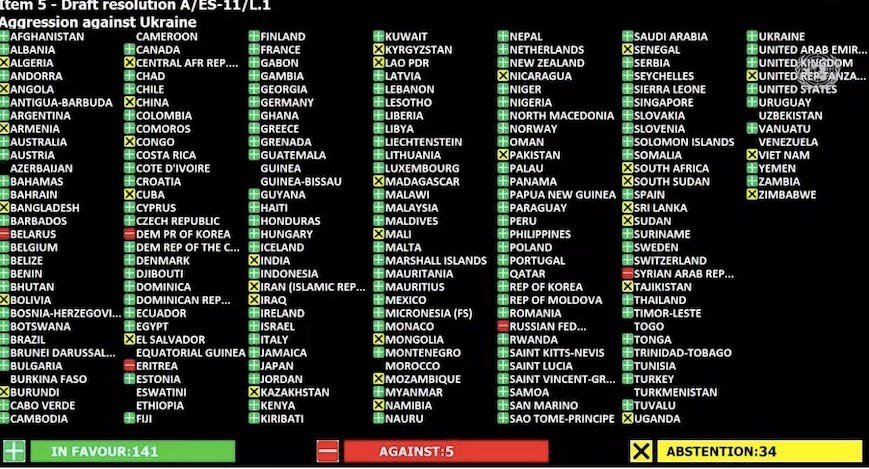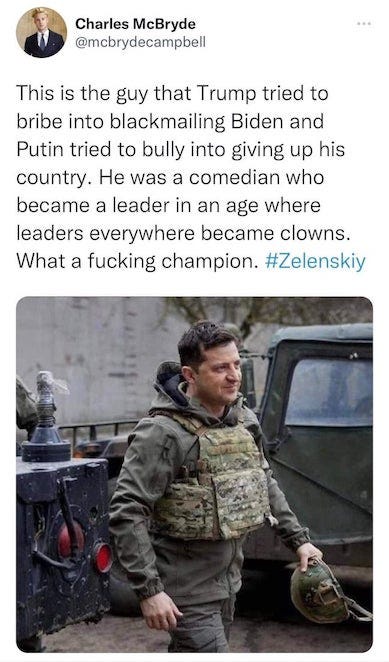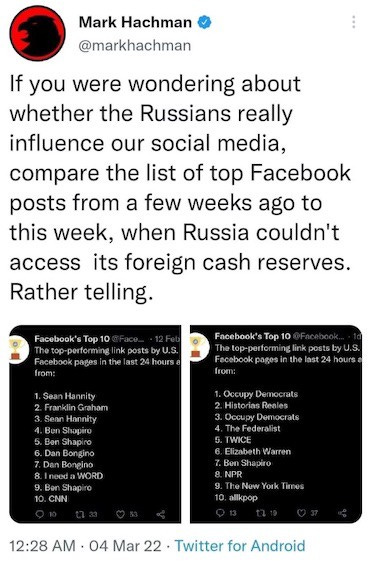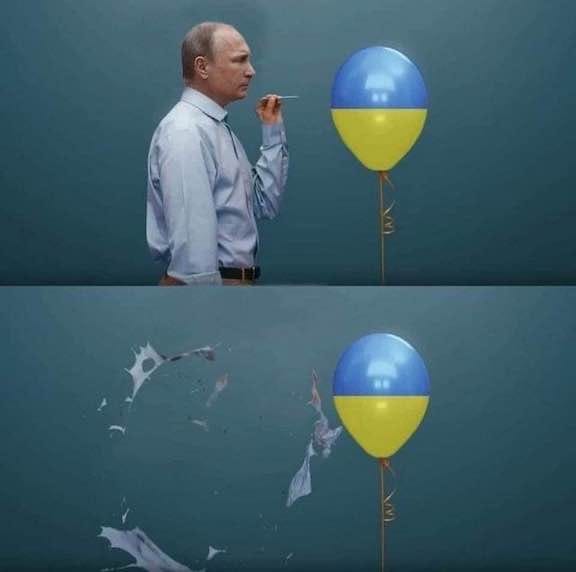What to read from the last week about Russia’s war in Ukraine
Here is what I read over the last week, and what happened, along with some of the better memes I saw.
Here is what I read over the last week, and some of the better memes I saw. It is surprising how fast we adapt. I have written about this a lot, woven into other narratives. Just like Covid became normal, it feels hard to remember back to a time before Russia’s war in Ukraine. It has flooded our minds, from social media through to mainstream media.
One of the most striking and important things to emerge is the suggestion by Estonia’s Foreign Minister that we are seeing the prelude to genocide. The Lithuanian Prime Minister also writes in the Economist that the former Soviet states have been warning about all of this for years, but were ignored by their larger Western partners. They know, as this happened to them.
Once the thought is out, it is hard to ignore. Yes, Putin wants to erase Ukraine, to subjugate it. That is why the Ukrainians are resisting so fiercely. Even Putin has said they would lose their statehood if they continue to resist his army. Putin always speaks in opposites, like suggesting he is not invading, and is rescuing them from Nazis, both statements now being entirely opposite to the truth.
Disgust around the world, and the extent to which Putin has isolated his country, was seen at the UN, when diplomats emptied the auditorium as Russia’s ‘foreign minister’ began a speech filled with lies and disinformation. In a UN vote condemning Russia, again the extent of Russia’s isolation has was reflected in only North Korea, Eritrea, and Syria voting with the Russians (Belarus, is now basically Russia).
While we have all been broken-hearted by the refugee crisis as women and children flee the bombing by Russian soldiers, it is striking that Russians are flooding out of Russia — also refugees from a dictatorship that has declared war on its own people too. Thousands of Russians have been arrested. One comment on my social feed was from a Russia girl saying there are now more police than people on the streets of her city in Russia. Despite this, there have been rolling protests across Russia with many thousands taking to the streets in cities everywhere. Putin has declared war on his own people as well.
Russians can only take $10,000 with them as they leave. The BBC covered the cars queued up on the Finnish border, trains are packed, and I even saw a post from someone I know looking for a ride in a private jet out of Moscow, ‘to anywhere.’
Russia has become completely cut off over the last week. Virtually no foreign media or social media is accessible now. Many people have taken to Telegram, or are using Tor and VPNs to try to connect with genuine news. Meanwhile, Putin’s propaganda machine is running at full speed, spreading lies and false information inwards at his own people. Plenty of people I know have said they are shocked to talk to relatives or friends in Russia who genuinely don’t believe there is a war, or that civilians are being shelled.
Russian entrepreneur in London, Pavel Titov, shared a unique insight into the way the Russian state is controlling its people in a post on his Facebook page about how entrepreneurs and SMEs have been stifled by bureaucracy in a drive to push everyone to end up working for the state. If everyone relies on Putin for money and food, his control over them is far stronger. (the full post is below)
Yet, despite shutting down the free flow of information, and despite beating and arresting Russians, the people are still protesting, and public opinion is not going Putin’s way. Chatham House produced a good paper on public opinion in Russia, suggesting it may turn against Putin, but also asking how we need to adapt sanctions once this war is over in order to avoid turning Russia even more against the West.
The BBC responded to the shutting down of external media in Russia by posting instructions on how Russians can still access the BBC. The post is reminiscent of the depths of the Cold War, or of German occupied Europe.
Here’s a reminder of how to get around the BBC ban in Russia:
Download the Psiphon app from the AppStore or Google Play Store
Look for the dedicated BBC site on the Tor Browser which can be found using this URL.https://www.bbcnewsd73hkzno2ini43t4gblxvycyac5aw4gnv7t2rc...
Note that this URL only works using the Tor Browser or the Onion Browser (on iPhones). If access to the apps is restricted then send a blank email to get@psiphon3.com or gettor@torproject.org. An email will be sent in response with a direct and safe download link. The BBC has also launched two new shortwave frequencies broadcasting World Service English news for four hours a day to Ukraine and parts of Russia:
15735 kHz from 14:00 GMT to 16:00 GMT
5875 kHz from 20:00 GMT to 22:00 GMT
Carol Cadwalladr, who should be credited with having been right about everything, wrote about how Putin has used social media against the West for years, but suddenly finds it turning on him. This is the first major information war. Security Affairs published a piece about how Ukraine is benefitting from a huge army of people sourcing, sharing, and analysing open source intelligence from around the country and from Russia, and hacking Russian targets. Cadwalladr points out that “the first stage in Putin’s invasion of Ukraine was an attack on information. He distorted reality, injecting the toxin of fake news — a military strategy that he deployed against us at the exact same moment across the exact same platforms.”
Whilst Russia is finally being shut out of the Western social media machine it has used against us, President Zhelensky has been using the media and social media with incredible skill.
Various people have shared posts and comments about how different Western social media looks now that Russian money has been cut off by sanctions. Despite people like me, Carol, and others shouting for years about how much of what we see on social media is made up and paid for in Russia, the fact that not enough was done in San Francisco is evident now that the money has stopped. All of a sudden, all the right wing, pro-Russian, anti-European troll spam has sort of vanished. When this is all over, we will need to stop and look at this, and force the American companies to respond. How much of their revenues are actually just from Russian information warfare?
Meanwhile, in the UK plenty has been written in the mainstream and social media about why the country has been slower to impose sanctions, or open its border to refugees than the rest of Europe. Alongside this, the extensive funding the governing Conservative party has received from Russian donors has been the subject of debate and accusations. Even traditionally right wing newspapers have started to look back at the way both the conservatives and the Brexit campaign received financial support and social media amplification from Russians.
The financial meltdown in Russia has been the subject of media coverage, and just a degree of awe. The Atlantic writes about Russia’s looming economic crisis. Putin did not plan for the world to be so united in their economic attack on Russia. The Economist points out that Russia’s attempts to protect itself from sanctions failed, mainly because so much of their foreign currency and gold reserves were held outside Russia, and are now frozen. It is also interesting how the economic damage has gone far beyond sanctions, with a huge number of large and small companies pulling their businesses out of Russia. Very soon, when stocks run out, Russians will find there is very little for them to buy in a country that doesn’t produce much more than oil, gas, and propaganda.
If you were wondering who is calling the shots in Russia, it is not war rooms filled with experts, but Putin and a few old men who have been in power far too long. The BBC explained who sits close to Putin.
MIT Technology Review wrote about how to avoid sharing disinformation in what is now a major information war, reminding readers to “realize that what you do online makes a difference. “People often think that because they’re not influencers, they’re not politicians, they’re not journalists, that what they do [online] doesn’t matter,” Whitney Phillips, an assistant professor of communication and rhetorical studies at Syracuse University, told me in 2020. But it does matter. Sharing dubious information with even a small circle of friends and family can lead to its wider dissemination.”
As we enter another week of war, Jeremy Bowen on the BBC paints a worrying picture. As all the failings of the Russian army continue to hamper its progress, it may fall back on the strategy it tried and proved in Syria and Chechnya, of besieging and shelling cities until the civilians and the army give in. This is a war crime, and it was reassuring to see that 39 countries — the largest number of countries since WW2 to do so — requested the ICC to begin investigations over Russia’s war crimes and crimes against humanity in Ukraine. Some road signs in Ukraine were changed to confuse Russian troops — all the place names the sign was pointing to were changed to ‘The Hague.’
Still shocked by the unthinkable war between Russia and Ukraine, I wanted to write a personal account of how events of the last decade preceding the war appeared on the inside.
I’m a Russian immigrant. I left the country in 2020 for the reasons that appear economic. But I had little choice as the alternatives meant to lose a living or to forfeit my career, and work for the state supporting the regime.
Estimates of state-controlled share of the Russian economy of 60–70% are well known. Less is known about life outside the state bubble. Even Russians who work for the state are oblivious to the life of ones employed in the private sector and entrepreneurs.
Since 2014, there was a consistent pressure on everyone who’s livelihood doesn’t depend on the state. It accelerated in 2016, once the Russian government realised that the new US administration is even less friendly to them than the previous one.
I’ve been self-employed and an entrepreneur in Russia between 2016 and 2020 and witnessed many of the restrictions even at a small scale.
Tax office suddenly introduces Kafkaesque redtape, requiring new complex paperwork for simple filings. I’ve received letters from the tax office threatening a criminal investigation for allegedly unpaid $0.80 worth of taxes. One may think it’s a sign of a strict rule of law, but there isn’t any. When I was defrauded by a property developer who ran away with a large prepayment, all confirmed by the paperwork, and asked police to investigate, the response was that I must be mistaken, and they will open a criminal investigation against me for libel if I contact the police again. Anyone can be declared a criminal at an official’s will.
Taking payments from customers was made as hard as possible. After 2018, Russian businesses that accept online payments are required to email a tax receipt (has to be in Russian even for export sales). The receipt must be issued for each payment by a specially certified tax register machine continuously connected to the tax office. Services like Stripe aren’t available or affected by the same regulations.
Larger payments were impacted too. Customers from many countries couldn’t send wire payments to Russia since 2014, as it’s easier for foreign banks to reject transactions than to check sanctions’ list with hundreds of entities. No foreign investments. A constant threat of sanctions with talks of shutting down SWIFT and cross-border payments any day since the 2018 Skripal poisoning.
There’s a theoretical option to do a business targeted to internal market if one can figure out how to grow in a market with real incomes decreasing for a decade. It’s telling that the most successful entrepreneur who started businesses after 2015 that I know achieved success with payday loans innovations and a temp work marketplace.
As a result, the only way to survive for most people is to work for the state or a state-controlled corporation.
I chose to emigrate instead.
It’s a one-way route. I had to forget a comfortable life in a beautiful flat I owned, a nice car, leave friends and relatives behind, move to a new country and start building my life again. Even in 2020 it didn’t feel like a choice.
I didn’t expect a war with Ukraine, but it was obvious that I’ll somehow lose the ability to make a living if I stay.
⚹ ⚹ ⚹
I didn’t want to publish this initially because of the atrocities of the war that are happening right now. The struggles I describe are incomparable to the suffering of people affected by the unfair devastating war between Russia and Ukraine that was unimaginable just weeks ago.
A few days ago, I received an email from a domain registrar. The email informed that the registrar decided to no longer work with me because I’m Russian, and therefore I must be using their services to earn money that pay for Putin’s aggression.
I decided to tell the reality of entrepreneurs who work in Russia, having to fight against the state to survive. They are heroes and painting them as war criminals is misguided.
(A tiny subset of oligarchs who made their money by monetizing their friendship with Putin via corrupt government contracts are another story.)
⚹ ⚹ ⚹
Initially, I assumed that the policies against private businesses were implemented to concentrate all productive efforts in a few large corporations architected to mimic soviet-era industrial ministries. Recent events showed that making most Russians dependent on state was the ultimate goal.
The West expected Putin to be restrained with a threat of sanctions. Instead, he embraced them readily. As one ambassador put it, “don’t give a shit about all their sanctions”. Lack of foreign trade, lack of access to foreign financial markets and 20% central bank rate are likely to destroy remaining private businesses that aren’t dependent on state contracts. In the short term, sanctions only benefit Putin.
More people are pushed into dependence on the state, making them less likely to question the politics of the giving hand. Most people can’t compare their true standards of living either: travelling abroad to developed countries was complicated because of visa regimes and is impossible now.
Having most of the population on payroll helps, but still was not sufficient to make people of Russia to accept a war with their closest neighbour where many have relatives. The solution was simple: acts of calling it a war and claiming that Russia attacked first were made punishable offences.
Any media that refers to the conflict as a war with Ukraine, or refuses to insist that it started because Ukraine was conducting genocide against Donbass rebels and was going to acquire and use nuclear weapons against Russia is simply taken off air.
Remember that major international social networks like Facebook or Twitter are now banned or restricted. Public gatherings are banned and result in immediate arrest. Repeat participation in ‘unauthorised’ rallies is punishable by criminal convictions, fines worth 2–4 years of salary and up to 10 years of jail time for the less lucky. Consistent political opposition activity is punished by freezing bank accounts.
Russians don’t want war. Never wanted.
People just don’t see a way to stop it.

